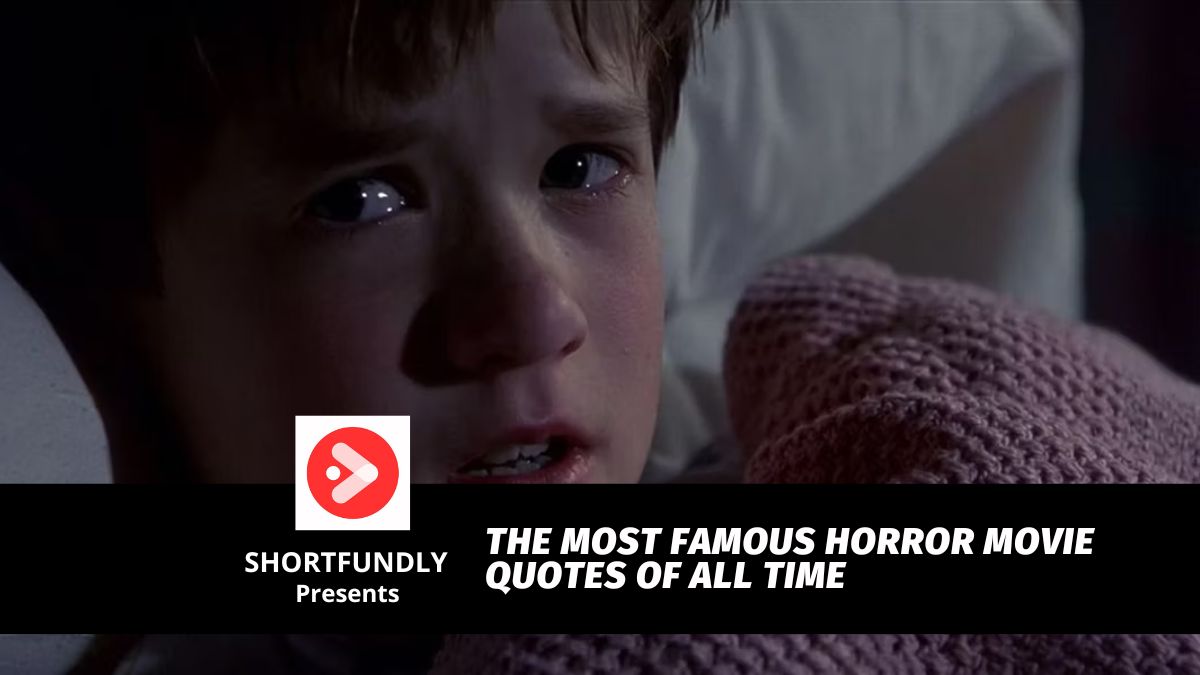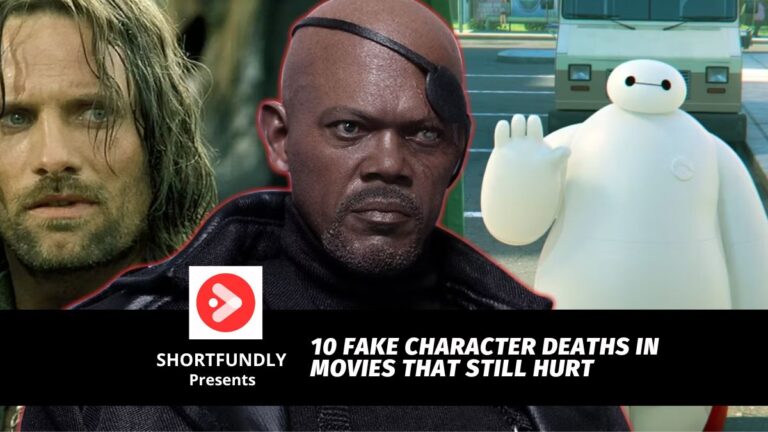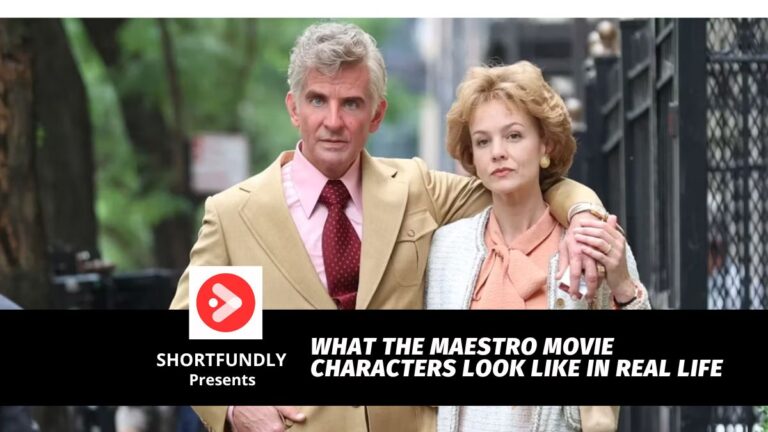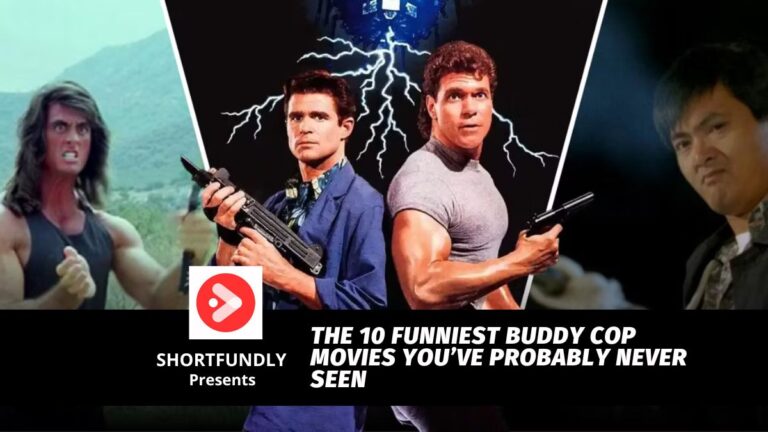Table of Contents
Horror movies often feature memorable lines that can become more well-known than the films themselves. Some of these lines are genuinely terrifying, while others possess a darkly comedic quality. A skilled actor’s performance can elevate a simple line to legendary status, and well-crafted writing also plays a significant role.
If the filmmakers recognize the catchiness of a particular line, it may become the movie’s tagline, and you might see variations of it in sequels and remakes. These lines can become cultural phenomena and even inspire parodies. However, it’s worth noting that what many people believe to be a famous line from a film can be misquoted from the original dialogue.
Update as of October 31, 2023: Happy Halloween! In celebration of this holiday, we’ve added even more fantastic lines from horror movies to the list, along with information on where you can stream these titles.
Sponsered English Shortfilm Playlist
The Most Famous Horror Movie Quotes of All Time
The Exorcist (1973) – “What an excellent day for an exorcism”
Undoubtedly, “The Exorcist” holds a paramount position in the history of horror cinema, as it not only pioneered the religious horror subgenre but also introduced a gripping twist to the dramatic aspect. To merely label it as a horror film would be an understatement. Written by William Peter Blatty, the same author responsible for the novel that served as its source material, the movie recounts the harrowing tale of a young girl succumbing to the clutches of a malevolent demon and the relentless efforts of priests to rescue her once conventional remedies fail.
The film boasts a plethora of unforgettable dialogues, but one that stands out is “What an excellent day for an exorcism,” uttered by the possessed Regan. This line is a clear standout because it effectively conveys the mischievous nature of the evil entity inhabiting the innocent girl’s body. While Regan’s more profane utterances may be more noticeable, this particular line unquestionably captures the genuine malevolence of the situation by highlighting the demon’s absurd approach to it.
Psycho (1960) – “We all go a little mad sometimes”
Alfred Hitchcock’s “Psycho” marked a groundbreaking moment in Hollywood, where a renowned director demonstrated the capacity to handle controversial horror themes. The film introduced several established horror tropes while also subverting certain conventions, marking a significant evolution in the genre. The story follows Marion Crane, who seeks refuge at a seedy roadside motel after stealing money, unaware of the danger lurking there.
The quote in question comes from the apparently benign motel manager, Norman Bates, who casually remarks, “We all go a little mad sometimes” during a seemingly ordinary conversation. Little did the audience suspect that this line hinted at the disturbing depths of Norman’s character, foreshadowing the horror that would unfold.
A Nightmare on Elm Street (1984) – “Whatever you do, don’t fall asleep”
Wes Craven created a chilling horror movie with the birth of “A Nightmare on Elm Street.” The film introduces a menacing ghoul with the ability to infiltrate people’s dreams, transforming them into terrifying nightmares and ultimately causing their demise in the real world, much like the idea of dying inside the Matrix.
Nancy, the teenage protagonist, learns how to protect herself and her boyfriend from the malevolent Freddy Krueger, especially when resources are limited. She imparts a crucial piece of advice to her doomed friend Glen, saying, “Whatever you do, do not fall asleep.” Falling asleep, a natural bodily function and a state of utmost vulnerability, is unavoidable. Reflecting on this advice, it becomes evident just how significant it is in the context of the movie.
Dracula (1931) – “I never drink… wine”
In the 1931 film adaptation of Dracula, there is a memorable scene where Count Dracula shares a glass of wine with Renfield. However, Dracula’s behavior raises suspicion when he declares, “I never drink… wine,” with a deliberate pause. This iconic moment serves as a subtle hint at his vampiric nature, as he prefers blood to wine. This pause in his statement adds to the eerie atmosphere, suggesting that Dracula is not a regular human being.
While this specific line doesn’t exist in Bram Stoker’s original novel, there are similar instances in the book where Jonathan Harker observes that the Count does not seem to consume food or drink. Dracula’s claim that he doesn’t “sup” (eat late) is a similar attempt to explain his unusual behavior. In the novel, there is indeed a supply of wine at Dracula’s estate, which Harker enjoys during his stay. Over time, variations of this line have been incorporated into other adaptations of Dracula, often used for comedic or parody purposes.
In the 1931 film adaptation of Dracula, there is a memorable scene where Count Dracula shares a glass of wine with Renfield. However, Dracula’s behavior raises suspicion when he declares, “I never drink… wine,” with a deliberate pause. This iconic moment serves as a subtle hint at his vampiric nature, as he prefers blood to wine. This pause in his statement adds to the eerie atmosphere, suggesting that Dracula is not a regular human being.
While this specific line doesn’t exist in Bram Stoker’s original novel, there are similar instances in the book where Jonathan Harker observes that the Count does not seem to consume food or drink. Dracula’s claim that he doesn’t “sup” (eat late) is a similar attempt to explain his unusual behavior. In the novel, there is indeed a supply of wine at Dracula’s estate, which Harker enjoys during his stay. Over time, variations of this line have been incorporated into other adaptations of Dracula, often used for comedic or parody purposes.
Suspiria (1977) – “Do you know anything about… witches?”
In the movie “Suspiria,” Suzy Bannion, an American dancer, arrives at the German Tanz Akademie but encounters a series of unsettling events. These events start when another student named Pat Hingle mysteriously disappears after fleeing into the woods. Pat is later found dead, and another friend also dies under bizarre circumstances. The school itself becomes a hub for strange occurrences. Suzy befriends another student named Sara, who is investigating these strange happenings, as she was friends with Pat.
Up to this point, the film follows a typical, albeit avant-garde, giallo movie format. However, the transition into horror occurs when Sara poses a chilling question to Suzy during a swim: “Susie, do you have any knowledge about… witches?” Before this, there are subtle hints of the supernatural in the film, particularly in the main theme where the only discernible word is “witch.”
The Silence of the Lambs (1991) – “I ate his liver with some fava beans and a nice Chianti.”
In “The Silence of the Lambs,” Clarice Starling is assigned the task of interviewing the serial killer Hannibal Lecter, with the hope of gaining insights that could help capture another serial killer, Buffalo Bill, known for skinning his victims.
Highlighting Hannibal’s cannibalistic tendencies, he once recounted a disturbing incident involving a census taker. He claimed to have consumed this unfortunate official, stating, “I dined on his liver with some fava beans and a nice Chianti,” as a result of the census taker’s attempt to test him. During this conversation, Hannibal also exhibits an unsettling hissing behavior after Clarice prompts him to introspect.
Interestingly, it’s worth noting that one of Hannibal’s most iconic lines in popular culture, “Hello, Clarice,” is a misattribution, as he never actually utters that phrase in the film. The closest approximation is when he wishes Clarice a “Good morning.”
The Wolf Man (1941) – “Even a man who is pure in heart…”
In the movie “The Wolf Man,” the character Lawrence “Larry” Talbot returns to his family’s ancestral home in Wales to reunite with his father. However, his life takes a dark turn when he is bitten by a wolf and cursed to transform into a werewolf. A recurring poem in the story underscores the tragic aspect of his transformation, suggesting that even a morally upright individual who prays at night can be compelled to become a werewolf when certain conditions are met. This poem is a reflection of the story’s theme, highlighting that the battle against the monster does not necessarily lead to a happy ending. The poem is recited multiple times in the movie, and one character speculates that it may symbolize the duality of the human psyche. Despite being often mistaken for an old saying, it was actually created specifically for the film. Larry acknowledges the poem’s recurrence with a humorous remark after hearing it more than once.
Carrie (1976) – “They’re all gonna laugh at you!”
Brian de Palma’s “Carrie” is a tale that revolves around the life of Carrie, a young girl who faces relentless bullying from her peers and endures the torment of her abusive mother, Margaret. In an attempt to make amends for the cruelty she witnesses, a compassionate classmate named Sue Snell orchestrates a plan for Carrie to attend the prom with her boyfriend. As Carrie prepares for the event, her mother, Margaret, cruelly insinuates that she will be ridiculed, proclaiming, “He’s going to ridicule you. Everyone will ridicule you!”
However, some of the other bullies are determined to humiliate Carrie and conspire to have her crowned as the Prom Queen, all with the sinister intention of dousing her with a bucket of pig’s blood. When this heartless prank unfolds, Margaret’s voice taunts her with the phrase, “Everyone is going to mock you!” Throughout this ordeal, Carrie can hear the laughter of her classmates, whether it’s real or a product of her imagination. Eventually, Carrie taps into a hidden power of her own and exacts her revenge.
The Terminator (1984) – “I’ll Be Back”
When you encounter the phrase “I’ll be back,” it’s nearly impossible not to mentally echo Arnold Schwarzenegger’s delivery. This particular line is from The Terminator, where it’s one of the T-800’s few spoken lines, yet it has inexplicably become one of the most iconic phrases in cinematic history. Its widespread recognition and popularity can be puzzling at first glance, as it appears to be a straightforward expression without any inherent distinction. However, what truly makes it memorable is Schwarzenegger’s distinctive voice, and this phrase eventually evolved into the actor’s unofficial signature catchphrase. Consequently, it has been imitated and alluded to in various other Schwarzenegger films, including subsequent installments in the Terminator series.
Release and distribute your short films, web series and album songs through Shortfundly and earn monthly. Click here to learn more.
The Sixth Sense (1999) – “I see dead people”
In the movie “The Sixth Sense,” a young boy named Cole Sear is isolated and possesses a unique ability to perceive a supernatural dimension, allowing him to see and interact with the deceased. He confides in his child therapist, Dr. Malcolm Crowe, with the famous line, “I see dead people.” Initially, Dr. Crowe assumes Cole is frightened by cemeteries or funerals, but Cole clarifies that he’s referring to actual spirits of the deceased. Cole also mentions that these ghosts often do not realize they are no longer alive, foreshadowing the film’s well-known twist that Dr. Crowe himself is one of these spirits.
Interestingly, this iconic line from the movie’s trailer became widely recognized even before audiences saw the film, which somewhat diminishes the surprise of discovering Cole’s supernatural ability, as it isn’t revealed until the middle of the movie.
The Shining (1980) – “Here’s Johnny!”
“The Shining” is a horror movie adapted from Stephen King’s novel of the same name, featuring Jack Torrance, his wife Wendy, and their son Danny as they head to the isolated Overlook Hotel, where Jack has accepted a job as a caretaker. As their stay progresses, Jack becomes increasingly influenced by malevolent spirits residing in the hotel, posing a threat to his family. In a well-known scene, Jack menacingly pursues Wendy and smashes through a bathroom door, evoking the character of the Big Bad Wolf. Upon breaking in, he delivers the famous line, “Here’s Johnny!” while wearing a menacing grin.
It’s worth noting that “Here’s Johnny!” was originally used by Ed McMahon to introduce Johnny Carson on “The Tonight Show Starring Johnny Carson” and was not part of the original book. This iconic line was apparently improvised by Jack Nicholson during filming. Additionally, the scene draws inspiration from a sequence in the earlier Swedish silent film “The Phantom Carriage.”
When a Stranger Calls (1979) – “It’s coming from inside the house”
“When a Stranger Calls” is a 1979 horror film that draws inspiration from the classic babysitter and the man upstairs urban legend. The story revolves around Jill Johnson, a babysitter hired to look after a doctor’s children. While the kids are asleep, Jill starts receiving unsettling phone calls that become increasingly menacing. She eventually contacts the police, who inform her that the calls are coming from inside the house, urging her to leave. Tragically, it’s revealed that the children are already deceased. In the 2006 remake, this suspenseful sequence from the original film is extended, and it also served as a notable reference in Wes Craven’s “Scream.”
The Fly (1986) – “Be afraid. Be very afraid.”
In the movie “The Fly,” a scientist named Seth Brundle becomes a horrifying hybrid of a human and a fly due to a teleportation experiment gone wrong. When he tries to convince someone else to use the teleporter, she expresses her fear, to which Seth scolds her and tells her not to be afraid. However, a reporter named Ronnie enters the scene and calmly warns, “No, you should be afraid. You should be very afraid.” Ronnie explains that her investigations have revealed Seth’s inhuman transformation.
The famous tagline “Be afraid. Be very afraid” from the film has been used in other movies as well. Uncredited producer Mel Brooks is often credited with suggesting the ironic line “Yes, be afraid, be very afraid” during a script reading, which was later incorporated into the movie as a response to the initial “Don’t be afraid” statement.
Jaws (1975) – “You’re gonna need a bigger boat”
In the movie “Jaws,” the residents of Amity Island face a terrifying menace in the form of a gigantic shark that’s been responsible for dragging people to their doom. To combat this threat, a team forms, consisting of a police chief, a marine biologist, and a seasoned shark hunter. Even though this trio bands together to tackle the shark problem, they may not fully grasp the true danger lurking beneath the waves.
During one of their early expeditions at sea, Chief Martin Brody experiences a shocking encounter with the immense shark while laying down bait. After witnessing the enormity of the creature up close, he calmly informs Quint, the shark hunter, “We’re going to need a bigger boat.” Quint later estimates the shark’s size to be a staggering 25 feet long.
It (1990) – “You’ll float, too!”
One of the most iconic moments in Stephen King’s novel adaptation in the miniseries is Georgie’s tragic demise. In the story, which takes place in 1960, young George Denbrough loses his paper boat in a storm drain. When he tries to retrieve it, he encounters Pennywise, the Dancing Clown. George is initially cautious around strangers, but Pennywise lures him with promises of the boat, cotton candy, and colorful balloons.
When George asks if the balloons float, the eerie clown responds, “Oh, indeed… They float, Georgie… They float… and when you’re down here with me… You’ll float, too!” Pennywise seizes George’s arm, sealing the doomed child’s fate. In the 2017 remake, variations of this line are spoken to different characters. In one memorable scene, Pennywise torments Bill, Georgie’s surviving brother, by pretending to be the deceased boy, repeatedly chanting, “You’ll float, too!” The chant grows louder as “Georgie” begins to deteriorate.
Frankenstein (1931) – “It’s Alive”
The phrase “It’s alive!” is closely associated with the character of Dr. Henry Frankenstein, the novel, and the movie. When people think of Frankenstein, this famous line from the 1931 film directed by James Whale often comes to mind. In this pivotal moment, Dr. Frankenstein, consumed by a mix of joy and madness, exclaims with trembling excitement as he witnesses the creation of life from nothing. This line has become an iconic moment in cinema, even earning the 49th spot on AFI’s list of the top 100 movie quotes. Dr. Frankenstein’s expression and the quiver in his voice reflect his elation at achieving the seemingly impossible, unaware of the destructive consequences his creation will unleash. Even those who haven’t seen the classic film Frankenstein are likely familiar with the phrase “It’s alive!”
Scream (1996) – “What’s your favorite scary movie?”
Scream, a cult-classic slasher film featuring the enigmatic killer Ghostface, kicks off with an unsettling phone call to high school student Casey Becker, who finds herself home alone. Initially, the caller’s intentions seem benign, almost accidental, and their conversation takes a casual turn. Upon noticing Casey’s popcorn, the caller inquires, “What’s your favorite scary movie?” The two even engage in a discussion about their preferred horror films.
This seemingly straightforward yet impactful dialogue has earned its place as one of the most iconic lines in cinematic history. It distinguishes Scream as more than just a typical horror movie; it’s a self-aware commentary on the entire genre. During the Halloween season, it’s not uncommon for people to humorously dial someone up and playfully ask, “What’s your favorite scary movie?”
Note:
*Shortfundly is hiring for multiple roles in Chennai. Start referring your known connections to these openings*. Check it out – https://lnkd.in/erZm6rzh
About Shortfundly
Shortfundly is an OTT marketplace platform available to share the best short films and web series through global multi-platform network. Their editorial platform enables global audience to easily discover, watch, and share unique contents anywhere on their desktop, connected TV and mobile devices.
If you are planning to release and earn on an OTT platform, learn how to distribute your short film via Shortfundly.
For publishing an advertorial article about your digital news/product launch/ short film/web series/album song on our website, drop an email at [email protected]
Hey Cinephiles! We welcome guest blogging on our platform. Do share your article with us.
Check out our Shortfundly YouTube channel for other interesting podcasts & interviews with filmmakers.
To watch unlimited premium short films & web series, Download the Shortfundly mobile application now available on Google Play Store and Apple App store.






